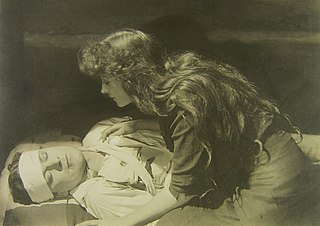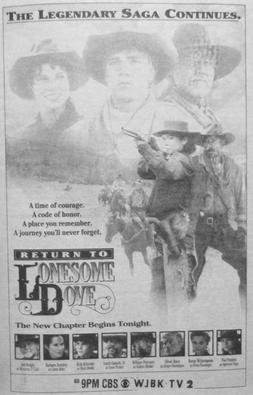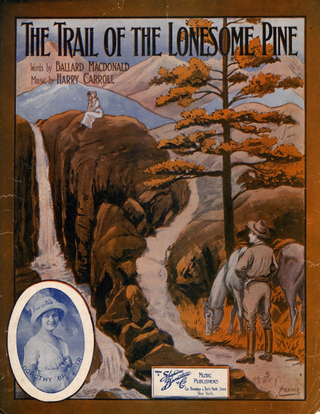The Oregon Trail was a historic migration route across the western United States.
"Are You Lonesome Tonight?" is a 1926 song by Lou Handman and Roy Turk, notably recorded by Elvis Presley.

Lonesome Cowboys is a 1968 American Western film directed by Andy Warhol and written and produced by Paul Morrissey. The film is a satire of Hollywood Westerns, and was initially screened in November 1968 at the San Francisco International Film Festival, where it won the Best Film Award. On May 5, 1969, it was shown for initial viewings at the New Andy Warhol Garrick Theatre in New York City.

The Trail of the Lonesome Pine is a 1908 romance novel/western novel by John Fox, Jr. The novel became Fox's most successful, and was included among the top ten list of bestselling novels for 1908 and 1909. It has been adapted numerous times for both stage and screen.

Simon Wincer is an Australian film and television director. He attended Cranbrook School, Sydney, from 1950 to 1961. On leaving school he worked as a stagehand at TV Station Channel 7. By the 1980s he had directed over 200 hours of television. In 1986, he directed the telemovie The Last Frontier and also won a Christopher Award. He also directed the 1993 family film Free Willy.
High Lonesome may refer to:

The Trail of the Lonesome Pine is a 1936 American adventure romance western film based on the 1908 novel of the same name. The picture was directed by Henry Hathaway starring Fred MacMurray, Sylvia Sidney and Henry Fonda.

The Trail of the Lonesome Pine is a 1916 American silent drama film directed by Cecil B. DeMille, who also wrote the screenplay. It is based on the 1908 novel and the 1912 play of the same name by Eugene Walter. Charlotte Walker reprised her role from the Broadway production. A copy of the 1916 film survives in the archives of George Eastman House.

The Trail of the Lonesome Pine is a 1923 American silent Western film directed by Charles Maigne and starring Mary Miles Minter. It was adapted by Will M. Ritchey from the play and novel of the same name by John Fox Jr. This was the second time that Maigne had directed Minter in an adaptation of a Fox novel, the first being 1920's A Cumberland Romance. This was Minter's final film; her contract with Paramount Pictures was not renewed, and she stated that she was "through" with films. As with many of Minter's features, The Trail of the Lonesome Pine is thought to be a lost film.

James Clarence Wakely was an American actor, songwriter, country music vocalist, and one of the last singing cowboys. During the 1930s, 1940s and 1950s, he released records, appeared in several B-Western movies with most of the major studios, appeared on radio and television and even had his own series of comic books. His duet singles with Margaret Whiting from 1949 until 1951, produced a string of top seven hits, including 1949's number one hit on the US country chart and pop music chart, "Slippin' Around". Wakely owned two music publishing companies in later years, and performed at the Grand Ole Opry until shortly before his death.

Return to Lonesome Dove is a 1993 American four part television miniseries, written by John Wilder involving characters created in Larry McMurtry's Western novel Lonesome Dove which was broadcast by CBS and first aired on November 14–17, 1993. The story focuses on a retired Texas Ranger and his adventures driving mustangs from Texas to Montana. It was nominated for an Emmy Award, and followed by Lonesome Dove: The Series.
The Trail of the Lonesome Pine may refer to:

"The Trail of the Lonesome Pine" is a popular song published in 1913, with lyrics by Ballard MacDonald and music by Harry Carroll. It was inspired by John Fox Jr.'s 1908 novel of the same title, but whereas the novel was set in the Cumberland Mountains of Kentucky, the song refers to the Blue Ridge Mountains of Virginia. In it, the singer expresses his love for his girl, June, who is waiting for him under the titular pine tree. It is perhaps best known for being performed by Laurel and Hardy in the 1937 film Way Out West. This version became a UK Singles Chart hit in 1975, some years after both actors had died.
Richard Edward Wormser was an American writer of pulp fiction, detective fiction, screenplays, and Westerns, some of it written using the pseudonym of Ed Friend. He is estimated to have written 300 short stories, 200 novelettes, 12 books, many screenplays, and stories turned into screenplays, and a cookbook: Southwest Cookery or At Home on the Range.

Lonesome Dove is a 1989 American epic Western adventure television miniseries directed by Simon Wincer. It is a four-part adaptation of the 1985 novel of the same name by Larry McMurtry and is the first installment in the Lonesome Dove series. The novel was based upon a screenplay by Peter Bogdanovich and McMurtry. The miniseries stars an ensemble cast headed by Robert Duvall as Augustus McCrae and Tommy Lee Jones as Woodrow Call. The series was originally broadcast by CBS from February 5 to 8, 1989, drawing a huge viewing audience, earning numerous awards, and reviving both the television Western and the miniseries.

The Silver Trail is a 1937 American Western film directed by Bernard B. Ray.
Clarence Oliver Drake was an American film/television director, screenwriter, producer and actor who was most active in the Western genre. Though Drake began his career as an actor, he is best known as a prolific screenwriter and director of low-budget Western films. Drake was most active in the 1930s and 1940s, although he continued writing and directing films until 1974.
Benjamin Harrison Kline was an American cinematographer and film director. He was the father of Richard H. Kline.
The Lonesome Trail is a 1930 American Western film directed by Bruce Mitchell, starring Charles Delaney, Ben Corbett, and Jimmy Aubrey. It premiered in New York City on August 7, 1930.
The Lonesome Trail is a 1945 American Western film directed by Oliver Drake and Lindsley Parsons, starring Jimmy Wakely, Lee "Lasses" White, and John James. It premiered in New York City on December 8, 1945.










